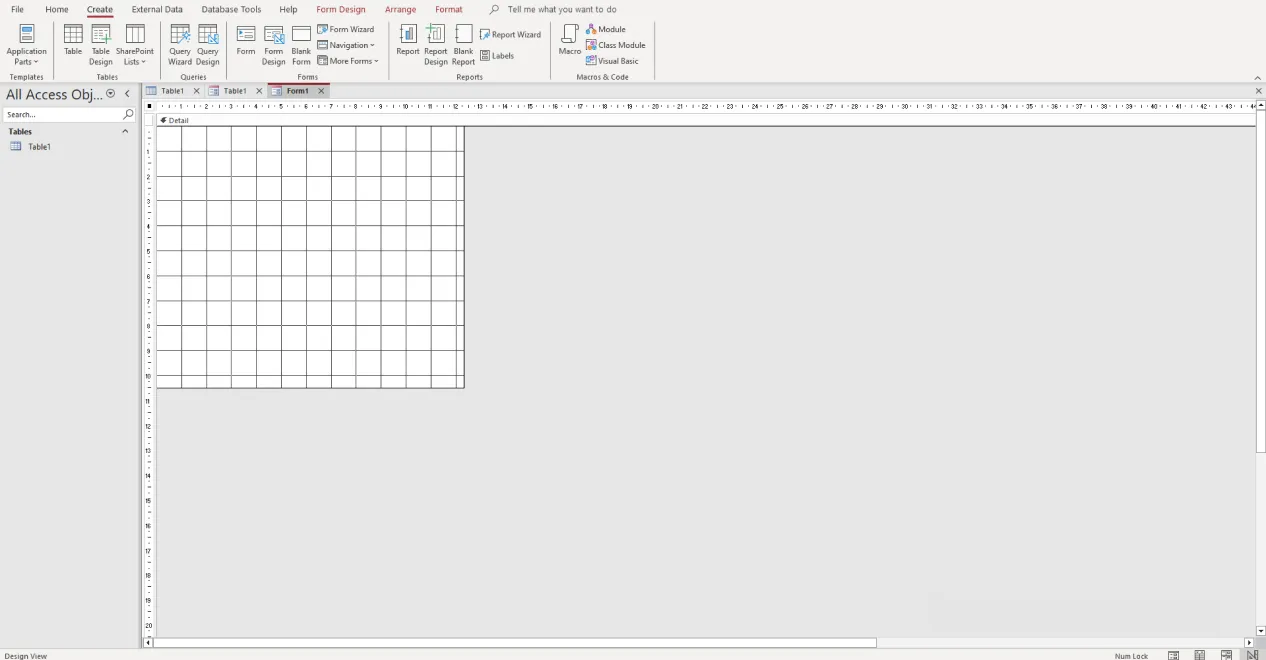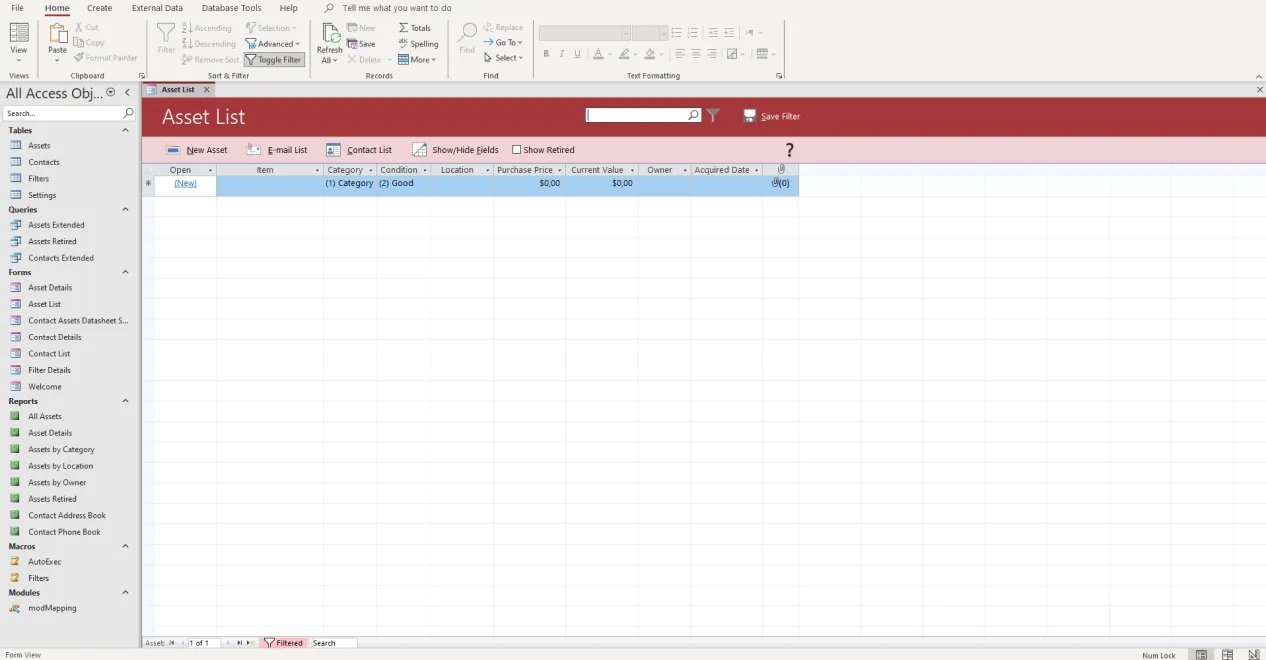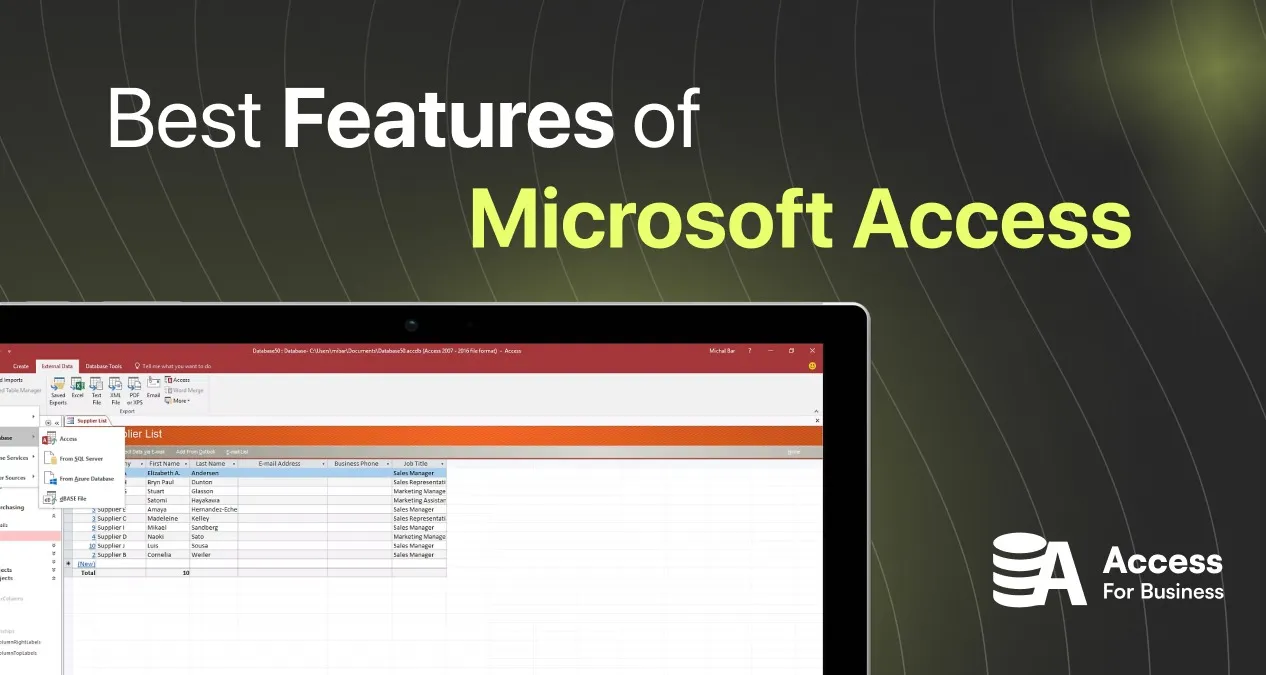If you strive for effortless organization, accessible export/import, and robust storing of your data, a Microsoft Access database is ready to help you and provides excellent options for effective work. In a span of three decades, Microsoft has been improving every next Access version to assist users in working with data and saving their time. Whether you are a professional or a newbie who needs to learn database basics, it is useful to find engaging info about Access features and provide excellent results.
Read the following article to learn each main Microsoft Access feature that can be handy when working with large amounts of data.
Features of MS Access
Access is a powerful database management system that is a lifesaver for both individuals and small businesses who need to save, compare, modify, or classify a large volume of data. Moreover, a great number of Microsoft Access database features has the potential to greatly simplify one’s life.
Using Access capabilities, you will be able to effortlessly create databases to keep various types of data, such as text, numbers, dates, and multimedia files. There you can input data into a table that is quite similar to the Excel ones. MS Access allows the creation of forms and designs with buttons and dropdown menus. When you are searching the pre-designed templates in the database, it presents a variety of them, so you can conveniently use whatever you need, and save your time.
Microsoft Access database features such as macros or modules allow the automation of both simple and complex processes. Users can create SQL (Structured Query Language) queries to extract specific data from their databases based on criteria. Additionally, Access provides the feature of reporting data, which allows making reports including charts and graphs. The import/export tools and integration with other Microsoft Office programs like Excel, Word, and Outlook are also available in Access to effortless moving material from or another source.
Generally speaking, Access is valuable for small to medium-sized businesses, educators, and individuals looking to streamline their data management. To find out more comprehensive information about any Microsoft Access functionality, our Microsoft Access programmers and developers can assist you.
The Core Features of Microsoft Access
The Access mechanism is for those who need to get rid of headaches when working with data. Thanks to the wide range of useful Microsoft Access features, users can easily operate, organize, and save data. Here is the list of these functions.
Creating Forms in Access
MS Access forms are one of the main instruments for displaying information in the database. They can help create the interface and allow users to manage the imputed data, modify it, and enter new information. Microsoft Access has a command button that lets users perform specific tasks. Moreover, creating a form in Access allows for the opening of other forms or other database objects.
Microsoft Access Database
A database is a system that allows you to work with data itself: add, edit, delete, move, save, and so on. The benefits of the database lie in the clear organization and structuring of data, allowing you to manipulate it and not lose important elements. MS Access is a good instrument for working with data, so whether you need to structure personal information or pieces of equipment – Microsoft Access Database will help you.
Microsoft Access Primary Keys
To ensure the effectiveness of each row with data, using the primary key Access option will come in handy. This instrument enables users to easily organize data within the table, requiring that every primary key field in Access must be completed, with no null rows. If you use this MS Access feature correctly, you can quickly identify unique data, and remove duplicates or other unnecessary items. This way you can manage the data at the row level.
Access Relationships
If you need to analyze, sort, or delete the excess data within two different tables, you can do it with the Microsoft Access relationships feature. By utilizing fields of tables, you’ll be able to readily compare the data, providing a clear view of essential information. It’s important to note that relationship fields can be assigned varying names, but they are required to possess identical data types. In addition, the MS Access relationships instrument has the following types: one-to-one, one-to-many, and many-to-many.
Access Database Templates
If you want to spend a minimum of time and effort creating a database, we have the solution for you! Access presents you with the availability of built-in templates that are already equipped with handy tools. Despite this, custom Microsoft Access templates allow you to modify tables, add or remove fields, change the design and layout of forms and reports, and even add your logic using VBA. Among such examples of templates, are Asset Tracking, Contacts, Students, Event Management, and so on.
Microsoft Access Table
What is a table in Access? It sounds simple enough, but it has some differences from others. The Access table is defined as a database object that stores data in a structured format. This block consists of records (rows) and fields (columns), where users can provide data entry. Although, based on the appearance, you can draw parallels with the well-known Excel worksheet table, the way of data saving differs. If you have different types of information, you should create different tables for clarity. That’s why Access Database tables are a more handy format for organizing the data. Overall, Access tables play an essential role in creating a well-structured and efficient database system.
Microsoft Access Reports
Following data manipulation, you can seamlessly prepare the conclusion of your dataset by employing the Access Reports instrument. This powerful report in Access tool allows you to highlight the general points that will briefly and succinctly summarize the data you were working with. In addition, users can print professional-looking reports from their database data. MS Access reports are a critical component of database applications because they enable you to present your data in a structured and visually appealing format for analysis and sharing.
MS Access Query
If you need to quickly filter data, calculate it, or apply other data manipulations, the Microsoft Access query feature is easy to use. There are two types of queries in Access such as, simple, focusing on basic data, or complex, involving calculations and data transformation. This tool enables users to extract specific information from one or more tables or other data sources, based on predefined criteria and rules.
Microsoft Access Macros
Macro in Microsoft Access is the function that helps users automate simple tasks and perform a series of actions in a sequence. With this tool, it’s possible to open forms, run queries, perform data validation, or perform reports that provide complex control flexibility, and clearness of all databases. So, this Microsoft Access feature is used to automate repetitive simple tasks in your database, by just clicking on the button, after adding appropriate conditions.
Backstage View Access
When you launch Access for the first time or close a database without exiting the program, you will encounter the Access Backstage view. This feature is handy for those who need to view recommended content on the portal without opening a database. Backstage contains commands for creating or opening a database. So, here you can complete some actions beyond the scope of your data.

Modules in MS Access
Like macros, Microsoft Access modules can also easily assist Access users in completing tasks within the database. Nevertheless, modules possess a distinctive feature that sets them apart. To meet specific database requirements, the creation of modules using the VBA language is necessary, which allows you to write custom code to extend the functionality of Access and create more advanced solutions.
MS Access Input Masks
The next useful Microsoft Access feature is input masks. This is practical for users to facilitate data entry in fields, tables, or forms. An Access input mask is used to ensure that data is entered consistently and accurately according to a specific pattern or format. So, if you work with data, where the control of quantity is essential (for example codes or numbers), the Microsoft Access input mask is a valuable instrument.
Validation Rule Access
An Access validation rule is the feature that controls data entry, namely restricting this action when necessary. This can include constraints such as data type, range, format, or any custom condition you define. Simply put, when a rule about inappropriate data entry is established, the user will be notified about it in case of non-fulfillment of the condition.
Import and Export in MS Access
Importing/exporting data is one of the essential features in Access, that allows moving data to or from different sources. Import MS Access refers to bringing data into a database. Various files (CSV files, text files, Excel spreadsheets, and so on) can be transferred from different sources into Access. Exporting data is the opposite process, where you take data from your Access database and transfer it to an external file or format.
Conclusion
To summarize, the Access database consists of various functions useful when individuals have accumulated a large amount of data that needs to be properly put in order and sorted. Access features allow users to handle their data even without special skills and bits of knowledge. So, we determined 14 main Microsoft Access features and presented them in this article in-depth, discovering how to use them effectively.
We believe that here we provided a comprehensive depiction of Microsoft Access functionality that will be useful for you in organizing your data. If you have any remaining inquiries, please reach out to Microsoft Access experts to gain further information.




